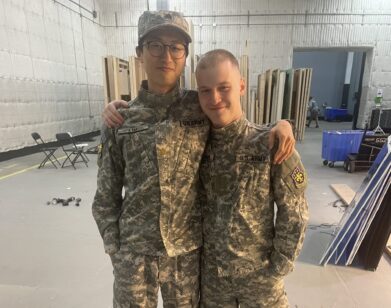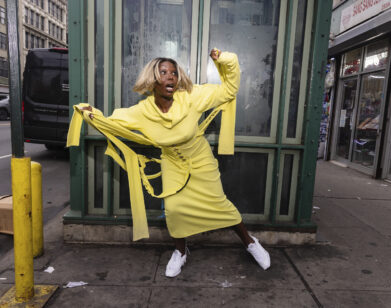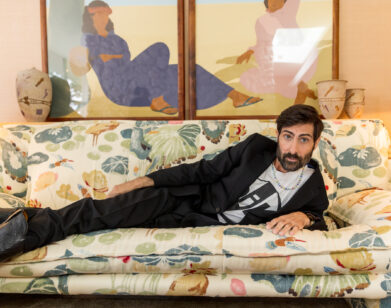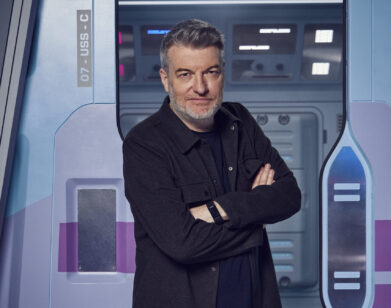In Converstion
Jake Gyllenhaal and Dar Salim on Sweat, Chess, and Chests
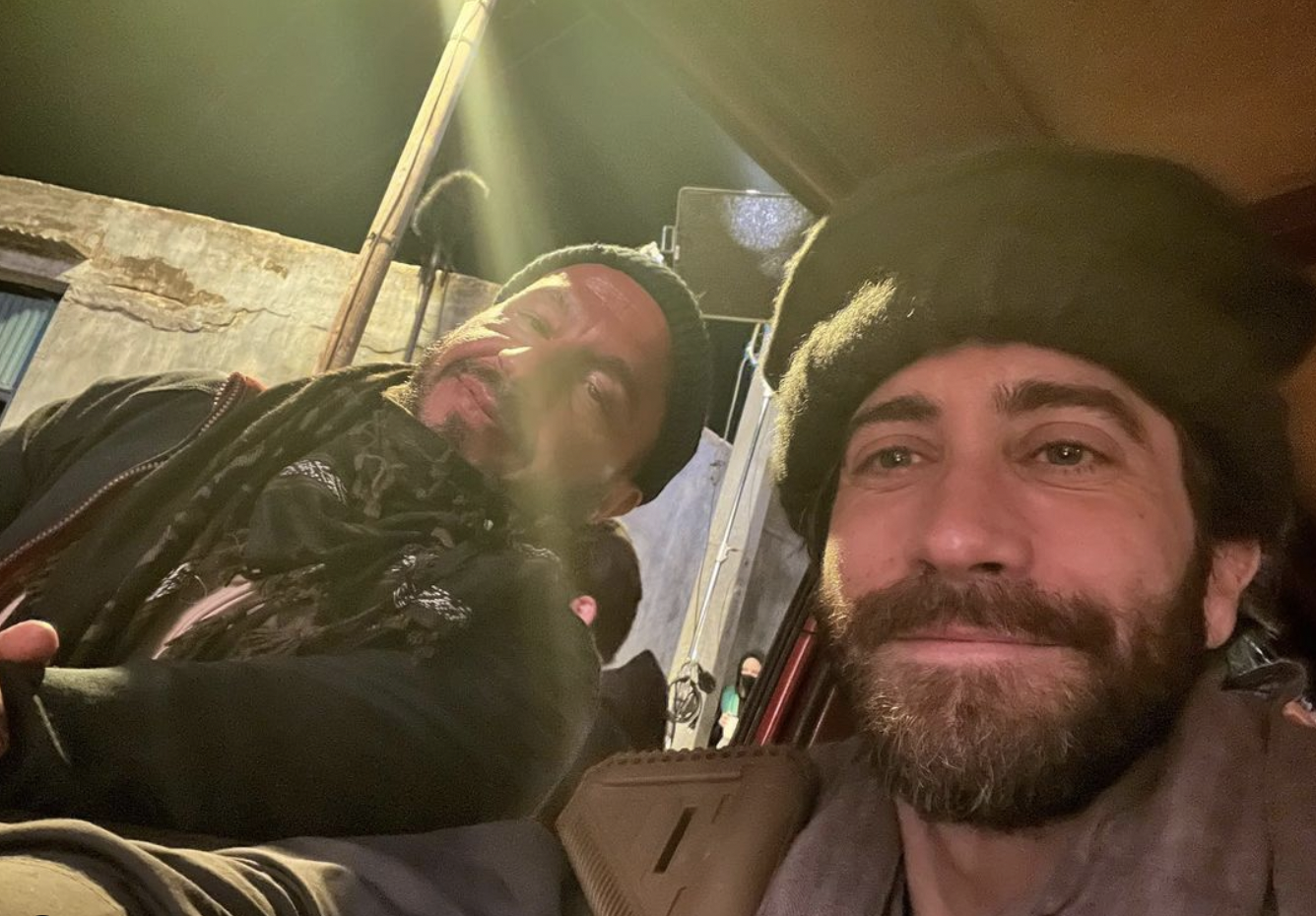
Photo courtesy of Jake Gyllenhaal.
Throughout his career, Jake Gyllenhaal has excelled at playing the tough guy with a soul. In Guy Ritchie’s The Covenant (yes, the director’s name is an official part of the title), he returns to that formula as a U.S. army sergeant who goes back to Afghanistan to rescue the interpreter who once saved his life on the battlefield. Joining Gyllenhaal as the interpreter is the veteran Danish actor Dar Salim, marking his debut in a major Hollywood production. The movie works in part because of the chemistry between its two leads, which, judging by the following conversation, works just as well off screen as it does on it.
———
JAKE GYLLENHAAL: I’m asking you a question first.
DAR SALIM: Oh, okay. I thought I was going to ask you a question.
GYLLENHAAL: You can ask questions if you want, but nobody cares about my answers. They want to know about you, Dar.
SALIM: I don’t think that’s true. Let me start by asking you a question. You’ve obviously done a lot of work before this movie, but how was it for you to do a movie of this magnitude, at this scale in Hollywood, playing a leading man for the first time?
GYLLENHAAL: That’s my question for you! But I can tell you what it felt like. Every single time I do it, there’s a part of me that can’t believe I get to do it again. Then there’s a part of me that’s bringing the experience of everything that I’ve done, and feels more and more comfortable being there. It’s this strange paradox.
SALIM: Yeah.
GYLLENHAAL: This one was different. When I choose movies now, in a way, it’s about process more than it is sometimes even about story. Story is king, but working with Guy was so interesting. The prospect of it, the idea of it, the thought of it—it’s like you’re in somebody’s mind when you’re working with a director.
SALIM: That’s true.
GYLLENHAAL: Speaking of that, when we first met, you had come from the sauna.
SALIM: Yes.
GYLLENHAAL: You hadn’t anticipated that the perspiration would continue into the meeting.
SALIM: I had not, no. I underestimated the temperature regulation here in London versus my body.
GYLLENHAAL: You’re Danish, so you’re like, “I’m going to take a nice sauna. I’m going to schvitz it out” Right? Is that what you guys do? Do you schvitz every day?
SALIM: It is a thing. It gets your endorphins going and all that. What happened was that I was meeting Jake Gyllenhaal and I was meeting Guy Ritchie, and I was convincing myself that I’m not nervous, and that I had nothing to be worried about. I was very laissez-faire in the morning. I took a sauna, and I even told the driver, “You know what? I’m going to walk.” Just convincing myself I belong in this situation.
GYLLENHAAL: By the way, you do. I understand the need to convince yourself, but I’m saying it objectively.
SALIM: I came to the meeting, and there you were sitting on a couch. Jake Gyllenhaal and Guy Ritchie.
GYLLENHAAL: Why do you keep calling me by my last name? That’s weird.
SALIM: That’s how I saw you.
GYLLENHAAL: Okay.
SALIM: Anyway, I sat down, and you were both very polite. You stood up and you gave me your seat. Guy Ritchie was very heartwarming and welcoming. Then maybe 15 to 19 seconds into that meeting I started sweating.
GYLLENHAAL: You were Albert Brooks in Broadcast News. I’m just going to say, it was starting to be disturbing after awhile.
SALIM: It was disturbing. I just had to own it. I couldn’t pretend I wasn’t sweating, because I was sweating my bald head and dripping into my eyelids. I had to wipe it off. Then I was this cliche of this guy being nervous at a meeting.
GYLLENHAAL: I remember you saying, “I don’t know why I just took a sauna.”
SALIM: I had to own it. I said, “Listen guys, I’m sorry. I came straight from the sauna.” And you were both so polite.
GYLLENHAAL: Guy and I respect the sauna.
SALIM: I know. We spent the next 20 minutes talking about sauna experiences, but we all three knew that at that moment, I lost all status and all masculinity, and I had to start from scratch.
GYLLENHAAL: I knew exactly how you felt, because I feel the same way starting off any new interaction or transition. But there was that moment where it was like, “I love this guy.” We do a lot of pretending and posturing, and our job is not about that. Our actual job is about vulnerability and sharing sides of oneself. You immediately were that.
SALIM: Let me ask you a serious question.
GYLLENHAAL: Okay.
SALIM: So you work out a lot.
GYLLENHAAL: [Laughs]
SALIM: But you have to stop laughing.
GYLLENHAAL: You’re funny.
SALIM: No, I’m trying to be serious for one second.
GYLLENHAAL: You’re a funny person.
SALIM: Okay, so you work out a lot.
GYLLENHAAL: Sorry, hold on.
SALIM: Can you do this without laughing? Just one question.
GYLLENHAAL: Yes. Sorry.
SALIM: You work out a lot. How much of that is inspired by my body?
GYLLENHAAL: [Laughs]
SALIM: Why are you laughing? We’re not doing this anymore. Let’s have someone interview us because this is not working for me.
GYLLENHAAL: Okay. This is what I’ll say. Pecs up is inspired by you. Pecs down, not so much.
SALIM: Do you mean I’m forgetting leg day?
GYLLENHAAL: No, pecs.
SALIM: What’s pecs?
GYLLENHAAL: The pectorals.
SALIM: Oh.
GYLLENHAAL: You wanted to get into it. No, you are my main inspiration, both physically, emotionally, and spiritually.
SALIM: Appreciate that.
GYLLENHAAL: Do we need to keep talking? How much do they need? Let me ask you this, actually. What is it that’s important to you about the movie that we made? What does it mean to you?
SALIM: Man, it means the world. I’ve worked with a lot of wonderful filmmakers back home, and I’m in a very fortunate situation, but the world is a big place. Some of the best storytellers and best actors present a totally different scope and way of telling stories. Just to be part of that journey is in itself amazing. Then on top of that, this film is about something real, an important issue. It’s a given that it’s a good action film with Guy in charge, but it’s about something. It’s about two very different people from different cultures who, despite all logic, choose to do the right thing. It’s a reluctant relationship, which is something I’m very drawn to. And it’s a heroic movie without being sentimental. To get to do that with some of the best in the world at their jobs, for me, was a once in a lifetime experience.
GYLLENHAAL: It’s not a once in a lifetime experience for you. You’ll see. I cannot wait for people to see you in the film. Those audience members who don’t know you or your work yet will be—and have already—been blown away by what you’re doing in the movie.
SALIM: Thank you.
GYLLENHAAL: Sometimes fate would have it that you’re involved in a movie that means so much to you. I feel that way about this movie, not just because of the story, which like you said, is so important, but because of the people who made it.
GYLLENHAAL: As someone who was a refugee, what does telling a story mean to you?
SALIM: I don’t feel like a refugee. I think my parents were refugees. They paid the price for that. Obviously, growing up as a refugee kid, you kind of have to learn everything on your own. You don’t have the same security net, you don’t have the same social skills, so as someone from other cultures with mixed background, it means a lot to be able to portray a man like Ahmed in a way that I hope the Afghan community will be proud of, and see a man who is a whole human being, with flesh and blood, who has a family, and who’s not like how we stereotypically portray these type of people. As an American, how does it feel to portray a man like John Kennedy?
GYLLENHAAL: This is the type of story that makes me proud to be an American, and it’s the kind of American that I want to be. I believe we have goodness ingrained in us, and we know what it takes to be a hero. We rise to challenges. Sometimes it takes us a while, but I think that for most Americans, we can’t really live our lives without doing the right thing. That’s a part of what is ingrained in our fabric. It’s the America that I love, and it’s a character that does that. In that way, it’s a reminder. It’s a movie that I’m so proud of because of that, and particularly in the world that we live in now, which seems so divided, sometimes just getting up and doing the thing that you don’t necessarily want to do, but you know you need to do, makes your day better, makes the world better. Someone once said to me that being selfless is selfish. It makes you feel so good when you do it.
SALIM: Yeah.
GYLLENHAAL: That’s what this character is. It’s a constant reminder to me. He inspired me while I did it, and I try to be more like him.
SALIM: Good answer.
GYLLENHAAL: How long is this feature? Five more minutes? What is this for again?
SPEAKER 3: Interview magazine.
GYLLENHAAL: Oh, okay. I have a question for you. When did you start playing chess, and why are you, after so many years, still so bad at chess? Why continue to do something that you’re so poor at?
SALIM: I started when I was in elementary school.
GYLLENHAAL: Do you mind if I just take a nap while you answer this?
SALIM: Yeah, go ahead.
GYLLENHAAL: I thought Guy may fire you when you beat him
SALIM: Then I let him win once. It was just in the beginning of the shoot, I didn’t want to take any risks. He’s a good chess player. I got lucky.
GYLLENHAAL: Right.
SALIM: It wasn’t like a big deal. It was just a game of chess. Then when I came to set the day after, I think the first 20 people I met said, “You beat Guy yesterday?” It was apparently a thing.
GYLLENHAAL: I think you did yourself in. They wrapped me early and had you running up and down the hill. The last thing I think we need to do is shout out Guy, because I haven’t had as much fun on a film maybe ever, and haven’t eaten as well maybe ever. Great coffee, too. I wasn’t drinking coffee at the time, which is rare for me, but you were drinking coffee.
SALIM: Very good coffee. He would send it back if it wasn’t exactly right. He’s such a perfectionist in everything that he does. He has such taste. He’s so knowledgeable about so many subjects and so curious. He’s a very, very eccentric, intelligent, and philosophical man. Just being in this company is just a joy.
GYLLENHAAL: You’re talking about me, right?
SALIM: I’m talking about you, of course.

